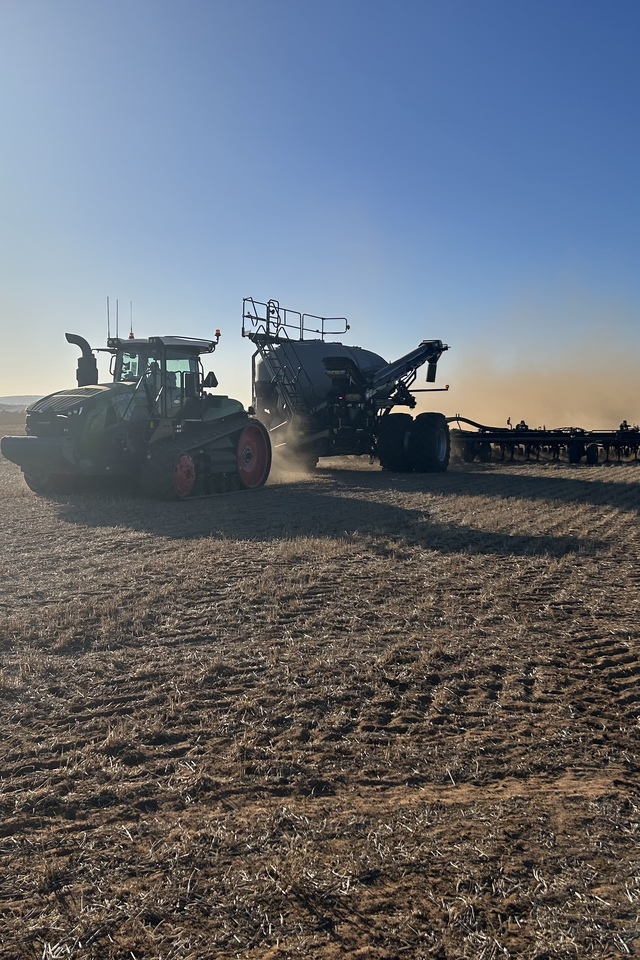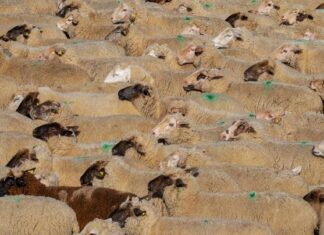It would appear that despite my best efforts it appears that it is, in fact, never going to rain again. So you may as well leave your seed in the silo and wait for
plant 2025.
Heck, just fallow the entire farm! It would appear that rain does not follow the plough and all this dry sowing caper is just feeding mice.
I say
take the next nine months off, clean out your workshop, buy in some sheep, and feed them that weather-damaged hay from 2022! Then buy a caravan and head off around Australia.
Seriously, the season break is indeed marching closer, however due to its tardiness, this year could see a substantial amount of seeding completed before the first drops of rain fall.
The ability to dry sow has escalated over the last 30 years, with the advent of knife points and disc seeder systems.
The move to towards a single pass system has also meant the ground is less compacted and modern tillage equipment is able to penetrate the soil, even in dry conditions.
Another advantage is that due to the wide suite of post-emergent selective herbicides, growers are able to tackle weeds missed by traditional pre-emergent herbicides.
However, the post-emergent herbicides are also at a premium cost-wise, and do not always do as good a job as a pre-sowing knockdown coupled with a post-emergent herbicide.
So, when will it rain? My money has shifted toward an early June break. Hopefully I am wrong and a downpour will occur as this goes to print.
I had a chat with Glen Bubner and, ever the optimist, he has provided a list of good things about dry sowing:
– It’s easy to see which way the wind is blowing
– No mud on your boots
– No mud on tractor, boomspray, airseeder, etc
– No need for expensive knockdown sprays
– No problems with compaction
– No annoying showers of rain to make everything sticky
– No comparing rainfall totals with the neighbour who always seems to have 2mm more than you
– You get to talk lots about The Federation drought which began in the mid-1890’s with the most extreme conditions in late 1901 and 1902, then the drought of 1944, which no one remembers anyway.
Chris Hammer on Audible
If you are looking for a new author to while away a few hours on the tractor this year, then give Chris Hammer a go.
Hammer was a chief political correspondent for the Bulletin, a senior political journalist for The Age, and a correspondent for SBS Dateline.
I have just finished listening to his book ‘The Tilt’ which was a follow up from ‘Treasure and Dirt’. You don’t need to read them in order but it will not hurt if you do.
I listen to a lot of books on the tractor, and both of these are well worth a go. When you are done with these, try ‘The Seven’, also by Hammer.
But back to ‘The Tilt’. This has been one of the most captivating books I have read (listened to) in a long time. Like all of Hammer’s books, it is based in Australia – this time, in the Riverina.
It is book two in a series based around two homicide detectives: Ivan Lucic and Nell Buchanan. With believable characters and excellent narration, the story commences towards the end of World War II and concludes in the present day.
The plot weaves its way through three generations and the twists will have you guessing till the last chapter. I challenge you to predict the ending!
Hammer also manages to wrap up his stories well, not leaving you frustrated. I rate ‘The Tilt’ a 5-star listen!
If you do not want to pay for Audible there is also the Libby app which is basically a library card for Audible books. Like library books, you may have to wait for your book to become available but it is free! You can set it up at your local library.
India suspends chickpea tariff
The Indian Government has suspended tariffs on Australian Desi chickpeas, a move that is poised to benefit both South Australian producers and the Indian pulse market.
Previously at a crippling 66 per cent, this will have a positive price lift on chickpeas in Australia, and give growers more confidence to plant this season.
India’s decision to suspend the tariffs is effective until March 31, 2025. It follows advocacy efforts from various stakeholders, including GPSA, Grain Producers Australia (GPA), Grain Growers Limited and Grains Australia.
The tariffs, originally established in 2017/2018, posed significant challenges to Australian chickpea exports to India, the world’s largest consumer of chickpeas.
South Australia is a strong contributor to the nation’s chickpea production, averaging more than 36,000 tonnes of chickpeas annually for the past five years, which further emphasises the importance of this decision for the state’s grain producers.
Thought for the week
Problems that were overblown when I was a kid: quicksand, making a face when a wind change is imminent, getting lost in the Bermuda Triangle.
Problems I was not sufficiently warned about: arguing with robots about unexpected items in bagging area, remembering all my passwords, how many squares contained a picture of a traffic light.
Credit: Jim Wilson Hobart








